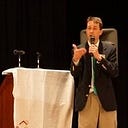How Adoption Changed My Life
Each child is unique, each child is special, and each child is deserving of such love. My love for them is equally the same, and equally as strong.
My family has grown by three children, bringing our total to six children, both biological and adoptive. All three of the youngest came to us through adoption from foster care. One of the joys I have found is that with all six of my children, I see no difference in skin color and no difference between biological and adoptive. My love for them is equally the same, and equally as strong.
I certainly did not set out and plan on adopting these three children from foster care. Indeed, over the 15 years I have been a foster parent, I have had over four dozen children come through my home, and only three were adopted. In truth, my wife and I tried to adopt four other children from foster care, but sadly, it did not come to pass, leaving all grief stricken and upset.
Of the over 450,000 children placed in foster care in, it is estimated that 108,000 of these foster children became eligible for adoption. Sadly, only around 51,000 of these children were adopted during that year, with over half of these children being adopted by foster parents, with the rest being adopted by family members, and a small percentage being adopted by non relatives.
For those children who are not adopted, many remain in the foster care system for extended periods of time. Some of these children are moved to group homes, while others simply age out of the foster care system, never truly finding a family of their own and a place to call home. Indeed, currently there are roughly 126,000 children in foster care who are ready for a forever home, an adoption home.
There are roughly 126,000 children in foster care who are ready for a forever home, an adoption home.
There are those time, though when adoption can be an emotionally difficult time for a foster child. No longer will the child be able to hope for possible reunification with his biological parents, or even with other members of his birth family. Instead, the termination of rights by his birth parents might produce feelings of grief and loss within him, fears he had kept bottled within himself during the length of his stay in foster care.
He may even feel that he has betrayed his biological family as he legally takes the adoptive parents’ last name, as well as becoming a permanent member of the family. You may find that the child revisits the stages of grief again, both during and after the adoption process. Indeed, it can be an emotionally traumatic time for adults and children.
The adoption of three girls into my home has taught me much, and has filled my home with more laughter, more tears,and more learning experiences than I would ever have imagined. To be sure, there are challenges involved, particularly the fact that all three children come from our small town of just over 2,000 residents, and we do not know who any of the birth fathers truly are. Yet, these challenges are far outweighed by the gifts of love each brings to our home and to our lives.
Dr. John DeGarmo is an international expert in parenting and foster care and is a TEDx Talk presenter. Dr. John is the founder and director of The Foster Care Institute. He has been a foster parent for 17 years, and he and his wife have had over 60 children come through their home. He is an international consultant to schools, legal firms, and foster care agencies, as well as an empowerment and transformational speaker and trainer for schools, child welfare, businesses, and non profit organizations.He is the author of several books, including The Foster Care Survival Guide: The Essential Guide for Today’s Foster Parents, and writes for several publications. Dr. John has appeared on CNN HLN, Good Morning, America, ABC Freeform, and elsewhere. He and his wife have received many awards, including the Good Morning America Ultimate Hero Award. He can be contacted at drjohndegarmo@gmail, through his Facebook page, Dr. John DeGarmo,or at The Foster Care Institute.
